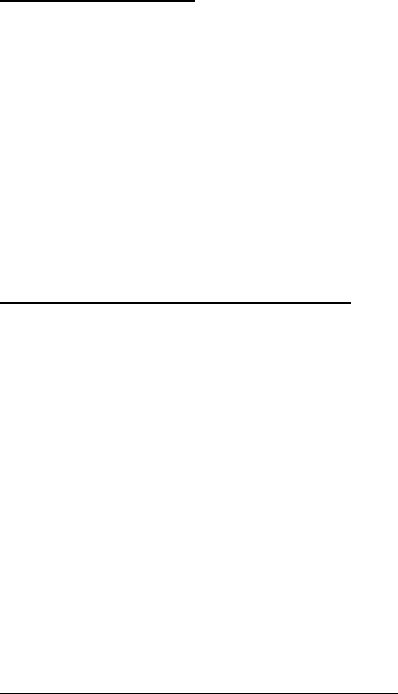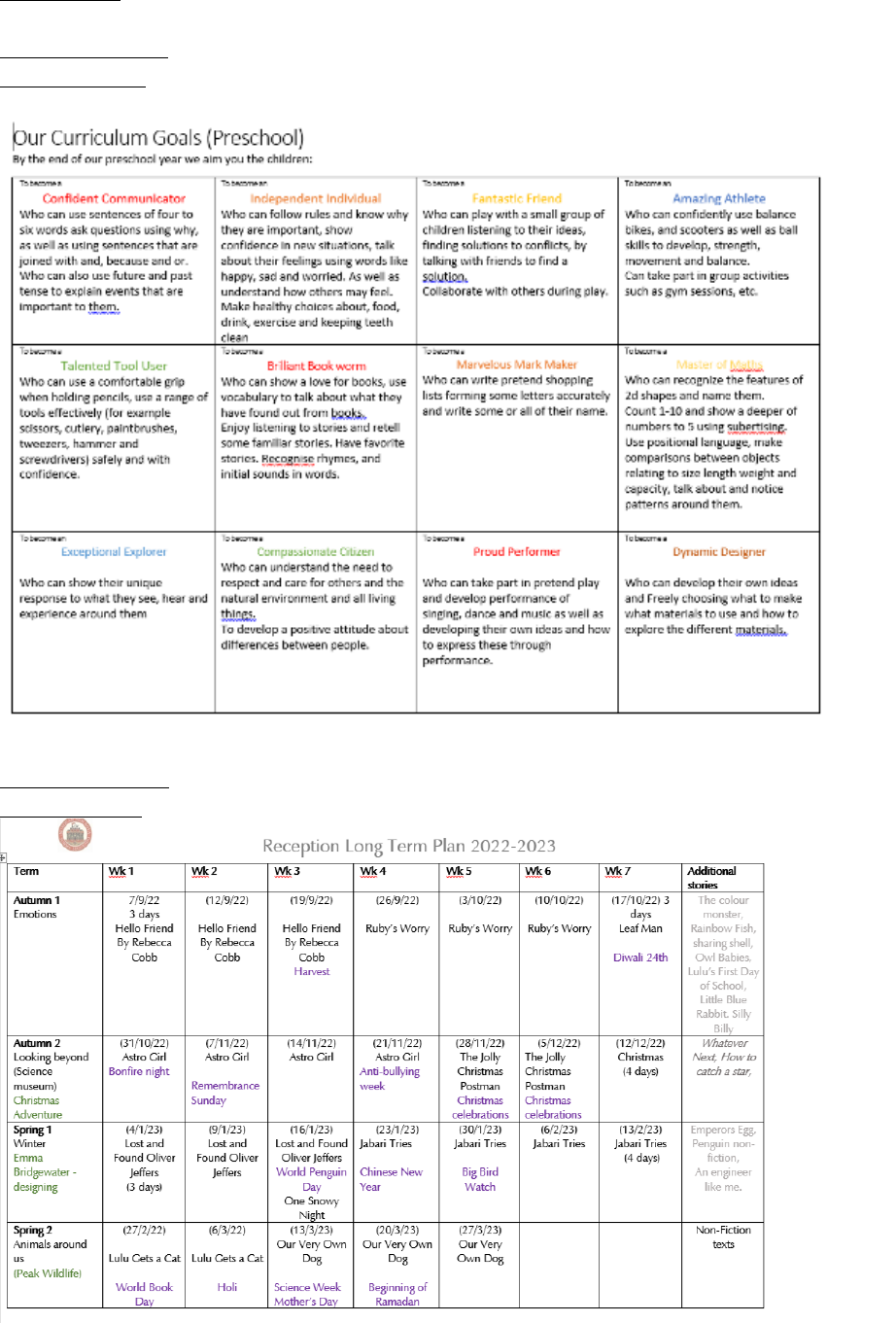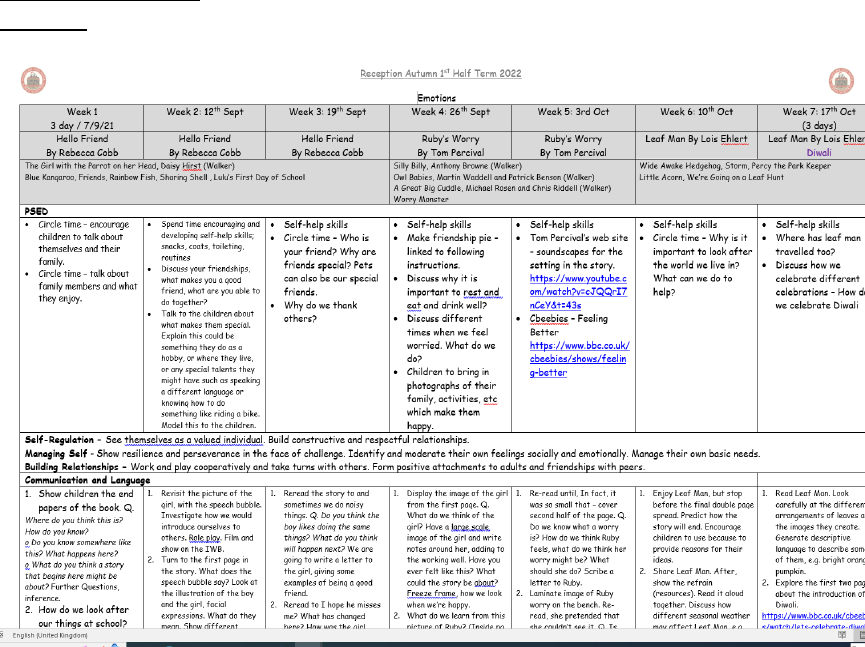
NEWCASTLE UNDER LYME
PREPARATORY SCHOOL
Early Years Foundation Stage Policy
1.0 Introduction
“Every child deserves the best possible start in life and the support that enables
them to fulfil their potential. Children develop quickly in the early years and a
child’s experiences between birth and age five have a major impact on their future
life chances. A secure, safe and happy childhood is important in its own right.
Good parenting and high quality early learning together provide the foundation
children need to make the most of their abilities and talents as they grow up.”
Statutory Framework for the Early Years Foundation Stage – DfE 2021
The Early Years Foundation Stage (EYFS) applies to children from birth to the end of
the Reception year. In the foundation classes (Nursery and Reception), high
quality, well resourced, integrated early education makes a positive contribution to
this distinct stage in a child’s development with the key learning skills of listening,
speaking, concentration, persistence, co‐operation, literacy and numeracy. Rich
stimulating and appropriate experiences will provide each child with opportunities
to develop these skills, their competencies and their thinking to the best of their
ability across all areas of learning.
2.0 Admissions and Transition
Children can start Little NULS Nursery at any time of the year, subject to
availability. The earliest being when they are two years old. The children can also
join the Reception class in the school year in which they are five.
The first contact is usually when a prospective parent telephones/emails
school, or registers on the school website and arranges to visit the Nursery.
An appointment is made and the parents are offered a tour of the setting
and the wider school campus.
Parents are given the necessary paperwork to reserve a place in Nursery
subject to a satisfactory completion of up to five trial periods to assess the
child is ready for Nursery. This paperwork includes a pupil profile, a
sessions list and an acceptance letter. With the parents’ permission, we may

contact the child’s current setting by telephone to ensure a smooth
transition.
On receipt of the returned paperwork, a letter, with the start date, is sent to
parents confirming the reserved place in Nursery.
Prior to the start date, a visit (up to five days if required) will be arranged for
the child and parents to spend some time in Nursery. During this visit the
Nursery staff can collect information about the child and advise the parents
about Nursery routines, uniform etc.
2.1 Transition arrangements into Reception
Most of the children in Pre-School transfer to our Reception class. For those
children who move on to other schools, we will liaise with the staff at the
intended schools and transfer the relevant developmental records.
During the spring and summer term we begin arrangements to facilitate the
smooth transfer of our children from Pre-School to Reception as detailed on
our school transition plan with opportunities such as meeting their new class
teacher, spending time in their new learning environment, meeting
specialist teachers which will start lessons with them in Reception,
becoming orientated with facilities such as the dining hall and swimming
pool and having taster swim sessions.
An Induction Evening is held in the summer term for all new Reception
parents. At this meeting, parents can meet their child’s form teacher and
other parents and gather information about the daily and weekly routines of
Reception.
2.2 New children into the Reception class
For those children who are starting school in September and have not
attended our Pre-School, we have a specific induction programme.
As with Pre-School children, prospective parents arrange a visit to school
and are shown around by the Head of Prep School.
On request, an offer of a place in Reception is made subject to the
satisfactory completion of a short informal assessment. All the necessary
paper work is sent to the parents.
Once the paperwork is returned to school, a letter is sent to confirm the
place and starting date.
Before the end of the summer term, the new children are invited into
school to meet their form teacher and become familiar with the Reception
classrooms.
Parents are invited to the Induction Evening to meet the staff and the other
parents.

3.0 Aims of the EYFS Curriculum
Effective education requires both a relevant curriculum and practitioners who
understand and are able to implement the curriculum requirements, taking
account of the rapid development of children at this age.
The EYFS is based upon four principles:
A Unique Child
Positive Relationships
Enabling Environments
Learning and Development
3.1 A Unique Child
At Newcastle‐under‐Lyme Preparatory School, we recognise that every child is a
competent learner who can be resilient, capable, confident and self‐assured. We
recognise that children develop in individual ways, at varying rates. Children’s
attitudes and dispositions to learning are influenced by feedback from others; we
use praise and encouragement, as well as celebration/sharing assemblies and
rewards to encourage children to develop a positive attitude to learning.
Inclusion
All children are treated fairly regardless of gender, race, religion or ability. All
children and their families are valued within our school. In our school we believe
that all our children matter. We give our children every opportunity to achieve
their best. We do this by taking account of our children’s range of life experiences
when planning for their learning.
In the EYFS we set realistic and challenging expectations that meet the needs of our
children. We meet their needs through:
planning opportunities that build upon and extend children’s knowledge;
experience and interests, and develop their self‐esteem and confidence;
using a wide range of teaching strategies based on children’s learning needs;
providing a wide range of opportunities to motivate and support children
and to help them to learn effectively;
providing a safe and supportive learning environment in which the
contribution of all children is valued;
using resources which reflect diversity celebrate differences and so promote
the core value of mutual respect;
planning challenging activities for children whose ability and understanding
are in advance of their language and communication skills;
monitoring children’s progress and taking action to provide support as
necessary.
preparing the children for the next stage in their school journey.
It is important to us that all children in the school are safe. We aim to educate
children on boundaries, rules and limits and to help them understand why they

exist. We provide children with choices to help them develop this important life
skill. Children should be allowed to take risks, but need to be taught how to
recognize and avoid hazards. We aim to protect the physical and psychological
wellbeing of all children. (
See
Whole School Safeguarding Children Policy.)
Safeguarding and Welfare
“Children learn best when they are healthy, safe and secure, when their individual
needs are met and when they have positive relationships with the adults caring for
them.” (The EYFS Framework 2021).
At Newcastle‐under‐Lyme Prep School we understand that we are required to
legally comply with certain welfare requirements as stated in the ’Statutory
Framework for Early Years Foundation Stage 2021’. To meet the requirements we:
promote the welfare of children;
promote good and oral health, preventing the spread of infection and taking
appropriate action when children are ill;
manage behaviour effectively in a manner appropriate for the children’s
stage of development and individual needs;
ensure all adults who look after the children or who have unsupervised
access to them are suitable to do so;
ensure all staff are trained to understand the safeguarding policy and
procedure;
exceed the minimum requirement for staff trained in paediatric first aid;
ensure that the premises, furniture and equipment is safe and suitable for
purpose;
ensure that every child receives enjoyable and challenging learning and
development experiences tailored to meet their needs;
maintain records, policies and procedures required for safe efficient
management of the setting and to meet the needs of the children.
3.2 Positive Relationships
At Newcastle‐under‐Lyme Preparatory School, we recognise that children learn to
be strong and independent from secure relationships. We aim to develop caring,
respectful, professional relationships with the children and their families.
Parents as Partners
We acknowledge that parents are children’s first and most enduring educators and
we value the contribution they make. We appreciate the role that parents have
played in the past and are doing presently. We do this through a range of different
ways, including:
talking to parents about their child before their child starts in our Nursery;
allowing children the opportunity to spend time with their teacher before
starting school/nursery.
inviting all parents of children starting in Reception to an induction meeting
offering parents regular opportunities to talk about their child’s progress;
encouraging parents to talk to the child’s teacher if there are any concerns.

During the course of the school year, there are two Parents’ Evenings for
every year group, (currently during the autumn and spring terms), and a
meeting for Nursery children.
All parents receive an end of term report in the autumn and summer terms;
arranging a range of activities throughout the year that encourage
collaboration between child, school and parents: class assemblies, sports
day, etc;
weekly newsletter.
Using Tapestry – an online Learning Journal which parents can access at any
time and are encouraged to add to it.
All staff involved with the EYFS develop excellent relationships with the children,
interacting positively with them and taking time to listen and engaging them in
extended conversations. Children are encouraged to express their idea and feelings
about their experiences using full sentences, including the use of past, present and
future tenses, with modelling and support from their teachers. At our school,
Reception teachers act as a ‘key person’ to all children in their class, supported by
the Teaching Assistant. In the Nursery and Pre-School each child has a base group
with a designated Key Person.
Our onsite Nursery and Pre-School provides an excellent opportunity for continuity
of learning through play and consultations take place with the Reception team.
3.3 Enabling Environments
We recognise that the environment plays a key role in supporting and extending
the children’s development. This begins by observing the children and assessing
their interests, development and learning, before planning challenging but
achievable activities and experiences to extend the children’s learning. At
Newcastle under Lyme School we consider the individual needs and interests of
every child.
3.4 Learning and Development
At Newcastle‐under‐Lyme Preparatory School, we recognise that children learn
and develop in different ways and at different rates. We value all areas of learning
and development equally and understand that they are inter‐connected.
4.0 Observation, Assessment, Planning and Reporting
Within the EYFS, we adopt a cross-curricular topic based approach to planning to
provide a broad and rich curriculum. These plans are used by the EYFS as a guide
for weekly planning; however the teacher may alter these plans in response to the
needs, achievements and interests of the children.
We make regular assessments of children’s learning through observation and we
use this information to ensure that future planning reflects identified needs.
The level of development children should be expected to have attained by the end
of the EYFS is defined by the Early Learning Goals (ELGs). These ELGs support
teachers to make a holistic judgement about a child’s development and their
readiness for Year 1 and subsequent support. Teachers draw on their own expert
judgement when assessing each child.

4.1 Planning
The curriculum for the Early Years Foundation Stage in our school reflects the
seven areas of learning identified in the Early Years Foundation Stage Curriculum.
The experiences that our children meet often enable them to develop a number of
competencies, skills and concepts across several areas of learning.
See appendix for example planning documentation.
4.2 Assessment
Newcastle-under-Lyme Preparatory School ensures that all children attending the
EYFS setting have a personal Learning Journey which records photos, observations
and comments, in line with the Early Years Foundation Stage, to build up a record
of each child’s achievements during their time with us. We use an online Learning
Journey System (Tapestry), allowing staff and parents to access and add to the
information from any computer via a personal, password-protected login (See
Learning Journey Policy).This information will then be passed on to Year 1 teachers
to assist with the planning and activities.
We make regular assessments of children’s learning and use this information to
ensure inform our planning. Assessment in the Early Years Foundation Stage takes
the form of observation which involves the teacher and other adults as appropriate.
During the children’s first half-term in the Reception class, the teacher assesses the
ability of each child using a bespoke in house assessment to give a reflection of
their baseline. The information gained is used to inform planning and give staff a
picture of each child’s starting point. The teacher completes the assessment again
at the end of the child’s reception year and records each child’s attainment level.
The child’s next teacher uses this information to make plans for the year ahead.
When children are 2 years old their key person will complete a progress check.
Parents will be given a short summary of the children’s development in the prime
areas and are offered a meeting with their child’s key person to discuss. This will
identify strengths and any areas where children’s progress is less than expected.
4.3 Marking Policy
Nursery/Pre-school children are given verbal feedback when they have completed
an activity.
Reception teachers use very short comments including smiley faces and verbal
feedback when marking work with the child.
4.4 Reporting
In the Autumn and Spring term parents of children in Reception, Pre-School and
Nursery are invited to discuss their child’s progress with the form teacher or key
person. In the Autumn term parents also receive a short report. At the end of the
Summer term, parents will also receive a full academic and pastoral report.

5.0 Teaching and Learning Style
In line with our expectations of effective teaching and learning in the Preparatory
School, the following features apply to teaching in the EYFS, just as much as they
do to the teaching in Key Stage 1 and 2:
the partnership between teachers and parents, so that our children feel
secure at school and develop a sense of well‐being and achievement;
the understanding that teachers have of how children develop and learn,
and how this affects their teaching;
the range of approaches used that provide first‐hand experiences, give clear
explanations, make appropriate interventions and extend and develop play
and talk or other means of communication;
the carefully planned curriculum that helps children to develop the skills
they need to progress their learning
the provision for children to take part in activities that build on and extend
their interests and develop their intellectual, physical, social and emotional
abilities;
the encouragement for children to communicate and talk about their
learning, and to develop independence and self‐management;
the support for learning with appropriate indoor and outdoor space,
facilities and equipment;
the identification of the progress and future learning needs of children
through observations, which are shared with parents.
5.1 Characteristics of effective learning
The EYFS also includes the characteristics of effective teaching and learning. The
Nursery and Reception teachers plan activities within the Nursery and Reception
classrooms with these in mind. They highlight the importance of a child’s attitude
to learning and their ability to play, explore and think critically about the world
around them.
The three characteristics are;
• Playing and Exploring – children investigate and experience things, and
‘have a go’
• Active Learning – children concentrate and keep on trying if they encounter
difficulties, and enjoy achievements
• Creating and Thinking Critically – children have and develop their own
ideas, make links between ideas, and develop strategies for doing things.
5.2 Playing and Exploring
“Play is essential for children’s development, building their confidence as they
learn to explore, to think about problems and relate to others.” (EYFS Framework)
Through planned, purposeful play as well as child led play our children explore
and develop learning experiences, which help them make sense of the world. They
practise and build up ideas, and learn how to control themselves and understand
the need for rules. They have the opportunity to think creatively alongside other
children as well as on their own. They communicate with others as they investigate

and solve problems. They express fears or re‐live anxious experiences in controlled
and safe situations.
5.3 Active Learning
“Children learn best through physical and mental challenges. Active learning
involves other people, objects, ideas and events that engage and involve children
for sustained periods.” (EYFS Framework)
Active learning occurs when children are motivated and interested. Children need
to have some independence and control over their learning. As children develop
their confidence they learn to make decisions. It provides children with a sense of
satisfaction as they take ownership of their learning.
5.4 Creativity and Critical Thinking
“When children have opportunities to play with ideas in different situations and
with a variety of resources, they discover connections and come to new and better
understandings and ways of doing things. Adult support in this process enhances
their ability to think critically and ask questions.” (EYFS Framework)
Adults support children’s thinking and help them to make connections by showing
genuine interest, offering encouragement, clarifying ideas and asking open
questions. Our classrooms are equipped with high –quality resources which are
easily accessible to the children providing a learning environment which
encourages children to follow their own interests and express their own ideas.
5.5 Areas of Learning and development
The EYFS is made up of seven areas of learning, comprising three prime areas and
four specific areas:
The prime areas are:
Communication and Language;
Physical Development;
Personal, Social and Emotional Development.
The four specific areas are:
Literacy;
Mathematics;
Understanding the World;
Expressive Arts and Design
None of these areas can be delivered in isolation from the others. They are equally
important and depend on each other. All areas are delivered through a balance of
adult led and child initiated activities. In each area there are ELGs that define the
expectations for most children to reach by the end of the EYFS.

5.6 Individualised Learning
We meet the needs of all our children through: -
Planning opportunities that build upon and extend children’s knowledge, learning
styles, experience and interests, and develop their self-esteem and confidence.
Using a wide range of teaching strategies based on children’s learning needs.
Providing a wide range of opportunities to motivate and support children and to
help them to learn effectively.
Providing a safe and supportive learning environment in which the contribution of
all children is valued.
Using resources which reflect diversity and are free from discrimination and
stereotyping.
Planning challenging activities for children whose ability and understanding are in
advance of their language and communication skills.
Assessing children’s progress and taking action to provide support as necessary.
As children grow older, and as their development allows, it is expected that the
balance will gradually shift towards more activities led by adults, to help children to
prepare for more formal learning, ready for Year 1.
6.0 The Role of the Key Person
The EYFS curriculum requires each child to have a key person on entry
to the setting.
In the Nursery, the children are divided into small groups and assigned a
member of staff as their ‘key person’. The key person works alongside
the Senior Early Years Practitioner and Nursery Manager in the Nursery
room and in the Pre-school works alongside the Pre-School teacher and
Nursery Manager.
The role of the key person is to help to ensure that every child’s learning
and care is tailored to meet their individual needs and to help the child
to become familiar with the setting.
The key person will seek to engage and support parents and/or carers in
guiding their child’s development at home. They will help families to
engage with more specialist support if appropriate.
Every Key Person implements an organised system with details of their
allocated children. These include online learning journals using the
‘Tapestry’ software. All staff are responsible for securing and updating
these records appropriately. There is also a contingency plan if a child’s
Key Person is absent.
Regular liaison takes place between the EYFS staff to ensure continuity. We also
appreciate our contact with each child’s parents on a regular basis throughout the
EYFS.
7.0 The Learning Environment
The EYFS classroom is organised to allow children to explore and learn securely
and safely. There are areas where the children can be active, be quiet and rest. The

classroom is set up in learning areas, where children access high – quality learning
resources independently. This empowers the children and puts them in charge of
their own learning. The EYFS classes have their own enclosed outdoor area. This
has a positive effect on the children’s development. Being outdoors offers
opportunities for doing things in different ways and on different scales than when
indoors. It offers the children opportunities to explore use their senses and be
physically active and exuberant. We plan activities and resources for the children
to access outdoors, that help the children to develop in all seven areas of learning.
7.1 Forest School
NULS’ Forest School aims to provide unique, hands-on outdoor
experiences for our Early Years pupils, it provides a safe and stimulating
environment to encourage enriched and independent learning.
NULS’ Forest School encourages pupils to explore and experience the
natural world through repeated practical involvement over an extended
period of time, the natural resources of the woodland and the children’s
own interest combine to stimulate imaginative, creative and investigative
activity.
Led by specially trained staff, Forest School activities include den building,
bug hunting, woodland craft, campfires, clay work and tool use.
We take part in Forest School in all weathers, with appropriate attire
provided, risk assessing on the day of additional safety measures or making
alternative plans in the case of extreme weather.
7.2 Anti-Bias Learning Environment
We aim to create an anti- bias learning environment, where all children are treated
equally. This will promote every aspect of the setting and will be put in to practice
by all staff and volunteers: -All staff will be positive role models by showing respect
to others and co-operating with everyone who comes into the nursery. This will
ensure that the children are aware that everyone must be treated equally and that
they should respect and understand their individual needs.
We will be open minded and interested in other people’s beliefs by
incorporating multi-cultural reading books and resources and celebrating
religious occasions where appropriate.
Children will be encouraged to have a strong sense of self and have
opportunities to express their thoughts, preferences and feelings, with
confidence.
All children will be encouraged to have a sense of belonging, be shown
appropriate care and affection and be valued for themselves. Staff will treat
children as individuals but with equal concern.
Staff will not be dismissive of things with which we are not familiar. We will
find out about them and share knowledge and understanding with the
children. We will not be judgmental on any issues raised by the children.
We will avoid gender stereotyping by being aware of our use of language
and the play opportunities, activities and resources being provided. All
children have equal access to toys, play materials and equipment.

All equipment at nursery, including pictures and books, will reflect children
and adults in a positive way. (e.g. Men and women in non-traditional roles.)
All staff will deal with discriminatory attitudes and remarks, by challenging the
action (See behaviour policy). In the case of name calling, bullying,
discrimination etc. staff should: -
Intervene straight away
Point out firmly that what was said/done was hurtful and not acceptable
Offer correct information on the issue and report any concerns to the
manager/director
If the remark was directed at a child, comfort the child and encourage
them to respond appropriately on their own behalf. Reinforce their self-
esteem.
A full Different Faiths and Equal Opportunities policy is available in school.
8.0 Special Education Needs and Disability (SEND)
Care is taken to assess the needs of each child from Nursery age onwards. If a child
has any special need, the parent will be informed at an early stage. Group and
individual help is provided within the school where possible. We have links with
various agencies and, when necessary, their involvement may be required to
support certain children. Parents/Carers will always be informed if an outside
agency is assisting us to support their child.
A full Special Educational Needs and Disability (S.E.N.D) policy is available in
school
9.0 EAL
For children whose home language is not English, we take reasonable steps to
provide opportunities for children to develop and use their home language in play
and learning and support their language development at home. We ensure that
children have sufficient opportunities to learn and reach a good standard in English
language during their time in the EYFS. If a child does not have a strong grasp of
the English language, we will explore the child’s skills in their home language with
parents and/or carers, to establish whether there is cause for concern about
language delay.
A full EAL policy is available in school.
10.0 Behaviour Management
We aim to promote an environment where everyone feels happy, safe and secure.
All children should be treated fairly in a consistent and positive way.
We believe that by establishing clear boundaries, which the children understand,
they quickly become aware of what is expected. This leads to appropriate
behaviour allowing everyone to work together in an effective and caring way.

We welcome and encourage the contributions from parents which enable us to
work in partnership to achieve standards of acceptable behaviour.
10.1 Expectations
ALL STAFF working in The Early Years Foundation Stage at NULS Prep and Little
NULS Nursery should: -
• Notice and praise good behaviour and focus on the positive rather than the
negative.
• Understand that positive approaches raise and maintain a child’s self-
esteem.
• Always provide a positive example for children to follow with special regard
to friendliness, caring and courtesy.
• Actively model courteous and kind behaviour to each other as well as to the
children.
• Encourage ‘please’ and ‘thank you’ to be part of the daily exchange
between all people in the setting.
• Always consider the child’s previous experiences, developmental stage and
different parenting patterns when dealing with any behaviour.
• Never use corporal punishment on a child or threaten its use.
• Staff should use a gentle, calm tone, and child friendly and age appropriate
language when dealing with undesirable behaviour.
• On occasion it may be necessary to separate children from one another or if
there is a situation where there is a risk of them causing the other/each
other harm. If this has been necessary we will inform the parent/carer at
pick up. It will be noted on the event/incident form to be relayed through
feedback at the end of the day and logged appropriately
• Rules within the different stages in Early Years:
- Are drawn up with children and explained regularly
- Are few in number
- Are worded positively
10.2 Procedures
When inappropriate behaviour occurs: -
• Ensure that we actively praise and reward good behaviour and focus on that
as an example to offset any inappropriate behaviour.
• Remove the child from the situation if the behaviour is disruptive and
upsetting other children.
• Talk to the child in a non-threatening one-to-one situation and explain, as
soon as possible, why their behaviour has been unacceptable.
• The Key Person, EYFS Co-Ordinator or Head of Prep School should inform
parents of any unacceptable behaviour which has occurred during that
session if it has caused real concern.

• If we start to notice a repeated pattern of unacceptable behaviour, the child
will be put on a behaviour chart (only if he/she understands the concept of
it) His/her behaviour will be monitored closely and a sticker awarded for
positive behaviour at each session. The chart will also serve as a record for
staff.
Further Action
• When concerning behaviour continues, it may be necessary to formalise the
approach in consultation with parents.
• Behaviour support through external services such as the MEAS team can
also be called upon for behaviours which require it.
10.3 Rewards
• Nursery and Reception children are consistently rewarded with praise and
encouragement.
• Special reward stickers are given for good behaviour and good work
throughout the week.
• In Reception, Merit certificates are awarded for special effort and
achievement both learning characteristics in and out of the classroom.
These will be presented by the Head of Prep School in assembly.
• In Reception children, are awarded house points for good attitude and good
effort in their work and for positive social behaviour. The house points are
recorded for each pupil on class charts. Pupils are awarded bronze, silver
and gold merit certificates as and when they reach present thresholds.
These are awarded in the weekly celebration assembly for Reception and
children in Y1-6.
11.0 Physical Contact and Care
We actively promote independence and work to develop children’s self-regulation
of emotions. However, given the age of pupils in our care often co-regulation is
required. Depending on the age of the child and their emotional needs, physical
comfort can be given, in view of others, with practitioners/teachers/teaching
assistants using their professional judgement to deem appropriate level of contact.
For staff that witness a level of contact they feel uncomfortable with they should
report their concern to the Head of Prep/Headmaster who will note their concern
in the Staff Concerns Log or escalate accordingly.
12.0 Toileting
There are toilet facilities within the Nursery/Pre-school and located close to the
Reception classrooms. The children can go whenever they need. If a toilet accident
happens this will be dealt with discreetly and we will inform parents at the end of
the day.

For those children wearing nappies we have a nappy changing policy which details
procedural actions and links with our intimate care log. Staff are within sight and
hearing of others and never in a closed space alone with a pupil.
For those children who are toilet training, their key person will work closely with
parents to ensure consistency in routine and approach.
13.0 Health and Safety
We have a Health and Safety policy available in school and all staff and
students are familiar with it. We have designated people responsible for
first aid in school. EYFS staff have had paediatric first aid training.
Health and Safety priorities are made to ensure: -
Children are taught the safe and appropriate use of equipment and
materials.
Children are taught to be mindful when moving around the school and
are aware of safety issues.
Risk is always taken into account before after school activities take place
and formal risk assessments written before we embark on school
outings.
Children are accurately registered in and out on each visit.
All toys are cleaned and checked regularly and manufacturer’s
guidelines followed.
Daily inspections of the environment are done to check for safety
before opening the Nursery. Any serious issues are reported to the
Nursery Manager/Head of Prep School.
Hazards and spillages are quickly eliminated.
All areas are kept clean and safe, particularly food preparation and
toilet areas.
All body fluids are treated as infectious and disposed of properly.
A ‘First aider’ is available at all times.
A fully stocked and comprehensive first aid box is always on the
premises.
Fire extinguishers are regularly maintained and inspected on a yearly
basis.
There are regular fire drills, clearly defined exits and an assembly point
that everyone on the premises knows about. All our evacuation
procedures are clearly displayed.
All visitors are signed in and out on each visit and are accompanied by
a member of staff at all times.
Members of staff working in the EYFS must not be in possession of a
personal camera or personal mobile telephone whilst working in the
setting. Members of staff in possession of a smart watch, must switch
the device to flight mode or remove it so that images cannot be sent or
received. Parents and visitors are also required to refrain from using

electronic devices for the purpose of making calls or recording images
in the setting. Staff should feel empowered to prevent visitors using
mobile devices in the EYFS setting. Parents of pupils in the EYFS are
asked to give consent to the use of Tapestry (Electronic Learning
Journey) to record images that illustrate the pupils’ individual
development. All images should be deleted once the pupil has left the
setting.
We do not allow any smoking, vapes or e-cigarettes on the premises.
Children are supervised at all times, within the required ratios as stated
in the Statutory Framework. This includes mealtimes.
13.1 Personal Hygiene
A healthy routine is paramount to ensuring that the highest standards of
personal hygiene of both children and staff are maintained. All children are
monitored after going to the toilet to ensure that they have washed their
hands properly. Before eating all children have their hands washed and
when appropriate, will be encouraged to wash their own. Children will also
wash their hands after outside play and activities.
In order to minimize the possibility of the spread of infections, to staff or
other children, staff will wear disposable gloves and aprons each time they
change a child. Staff will also wear disposable gloves when administering
first aid.
If a child has head lice, we must insist that the child is treated immediately
in accordance with the advice of their G.P. N.B. Children will not be
excluded from the setting because they have head lice. Information will be
shared with parents to support them with the treatment of head lice.
13.2 Food, Drink and Hygiene
The preparation of snacks will be done to the highest of standards. Children
will be provided with meals, snacks and drinks that are healthy, balanced
and nutritious.
All staff, who handle food, have a Basic Food Hygiene Certificate and will
provide healthy and nutritious snacks on a daily basis, following strict food
safety guidelines. ‘
Parents/carers are asked to inform us of any foods their children are allergic
to or any foods they do not wish their child to eat. A note of this is kept in
the kitchen area and all adults involved are informed.
Fresh drinking water is available and accessible to children at all times.
14 Medical Needs
14.1 We will promote good health, including the oral health and wellbeing of all
the children in our care and take the necessary steps to prevent the spread of
infection. Staff will take appropriate action when children are ill or unwell.
14.2 Parental Responsibilities

We must be informed of any child illnesses, sickness or problems before bringing
the child onto the premises. To prevent the spread of infection, it may be
necessary to exclude any child who has been diagnosed with certain contagious
illnesses and diseases e.g. chicken pox, scarlet fever, mumps, rubella, measles etc.
This exclusion will remain until the condition has been cleared by the child’s
doctor. Children with gastroenteritis or stomach bugs must be treated as infectious.
Children can only return 48 hours after the illness has passed.
Parents should take every opportunity to ensure, as far as possible, that medicines
required by their children are taken outside school hours.
Parents will be required to give prior consent by completing a form to administer
medicines to their child as this policy allows the school to do so. See school policy
for further details.
15.0 Complaints Procedure
If any parent is unhappy with the education that their child is receiving, or
has any concern relating to the school, we encourage that person to talk to
the child’s class key person/teacher immediately.
If talking to the teacher fails to address a parent’s concern, then the issue
can be taken up with the Nursery Manager/Assistant Head of Pre-Prep, then
the Head of Prep School and the Headmaster. If the parent so desires, a
complaint can be put in writing to the Headmaster.
Any written complaints relating to the fulfilment of the EYFS requirements
will be investigated and the complainants will be notified of the outcome
within 28days of receiving the complaint.
Parent can also contact OFSTED (Royal Exchange Buildings, St Ann's
Square, Manchester M2 7LA) or the Independent Schools Inspectorate (CAP
House, 9 - 12 Long Lane, London EC1A 9HA, Telephone 020 7600 0100)
to make a complaint.
Full details of the complaints procedure are available on the website.
Monitoring and review
It is the responsibility of all staff teaching in the EYFS to follow the principles stated
in this policy.
The Head of Prep, Assistant Head of Pre Prep and Nursery Manager will carry out
monitoring of the EYFS as part of the school’s monitoring schedule.
Author: N Erian
Reviewed by PLT: January 2024
Reviewed by EYFS Staff: January 2024
Review Date: by August 2024

Appendix 1.
Example of Early
Learning Goals
Example of Long
Term Planning

Example of Weekly
planning
